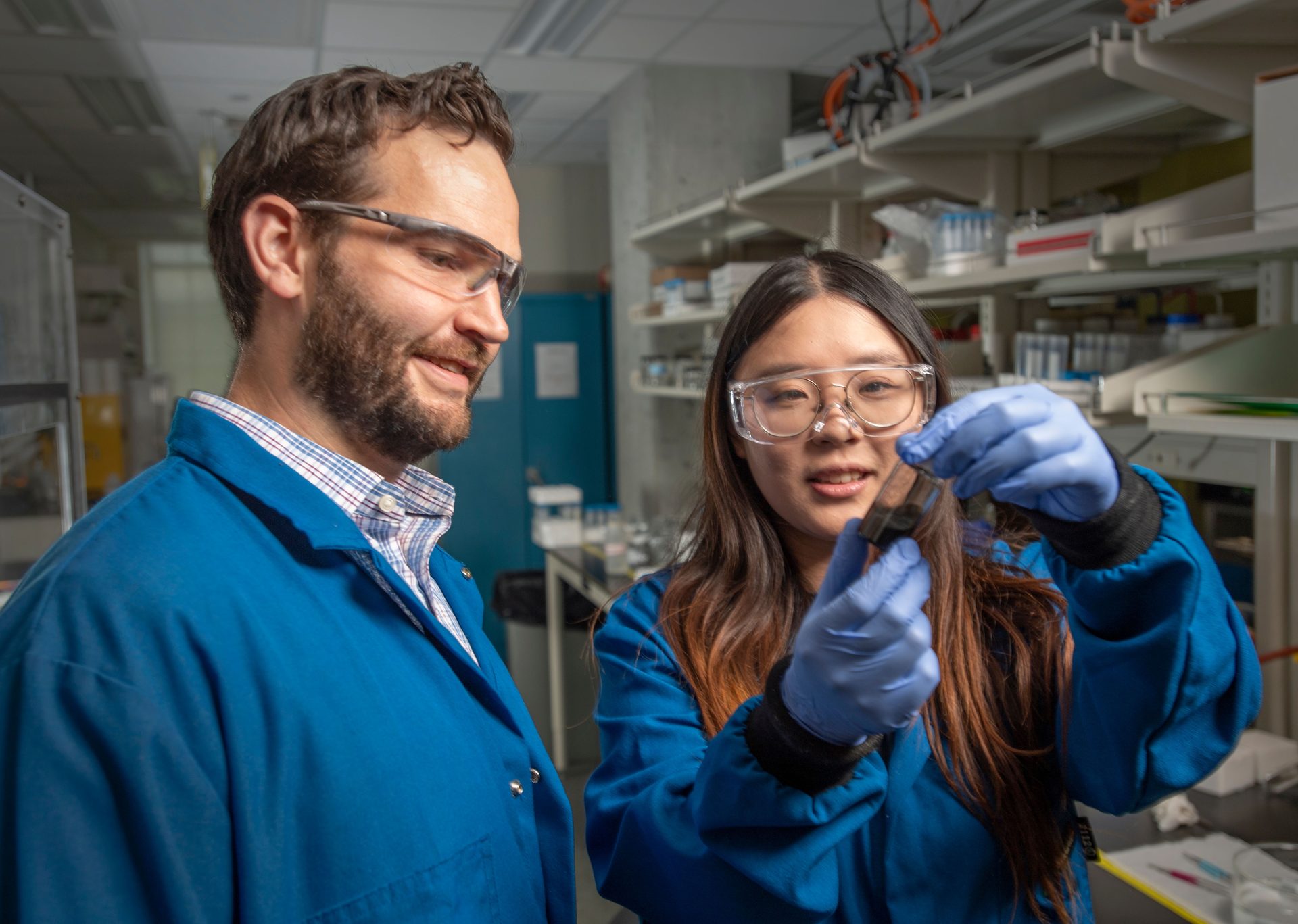Professional development, expert faculty members, world class facilities, and diverse research in a supportive environment – these are just a handful of factors that draw students across the globe to pursue graduate studies at University of Notre Dame’s College of Engineering, known for crafting bright career pathways tailored to each student’s academic and research interests.
Ranked #45[1] among the nation’s best engineering schools, this is where skilled leaders and passionate innovators gather to change lives. Guided by Notre Dame’s mission to be a powerful force for good, the college devotes itself to educating students who can contribute solutions to some of the world’s greatest challenges. Together, they conduct groundbreaking research to enable healthier and safer lives.
Great graduate outcomes
Over the last 10 years, 57% of engineering graduate students have progressed into professional employment within the industry, while 27% have moved on to postdoctoral training. Ten percent joined academia, finding tenure-track, research, or teaching positions at higher education institutions.
The school’s latest Graduate Outcomes Report shows that you can find a Notre Dame engineering graduate in almost every corner of the world. Graduates have gone on to work in countries such as China, South Korea, Austria, Malaysia, Pakistan, and more. Their employers are equally diverse – many graduates hold prominent leadership roles in universities, national laboratories, and multinational corporations such as Intel, Google, Amazon, Apple, and so on.
“Graduates of our PhD programmes are equipped to pursue successful careers in academia, industry, and government agencies. They acquire advanced skills, diverse experiences, and a commitment to holistic growth at Notre Dame Engineering, becoming trusted leaders, ready to make meaningful contributions and create a better world for all.”

– Patricia J. Culligan, Matthew H. McCloskey Dean of the College of Engineering
– Patricia J. Culligan, Matthew H. McCloskey Dean of the College of Engineering
All PhD programmes provide comprehensive financial support. There is a generous 12-month stipend, with significantly increased amounts for those with fellowships. The programmes also cover 100% of health insurance premiums, offer full-tuition scholarships, and provide funding opportunities for conference and workshop travel, all on top of dedicated graduate career coaching.[3]
World-changing research
With over 150 students, the PhD in Aerospace and Mechanical Engineering is one of the largest graduate programmes at the University. This is reflected in the programme’s funding – researchers here bring in over US$20 million annually in external research grants.
Groundbreaking research is spread across five key areas: bioengineering, computation, fluid mechanics, materials, energy and manufacturing, and robotics and controls. Graduates from these programmes have secured positions with top companies like Google, Intel, NASA's Jet Propulsion Lab, and prestigious academic institutions.
Aerospace and Mechanical Engineering

The PhD in Chemical Engineering covers the core principles of the field through a rich combination of coursework, research, faculty mentoring, and professional development. Research areas span bioengineering and diagnostics, energy and sustainability, molecular simulation and data science, and soft matter and nanomaterials.
The programme excels in creating skilled researchers able to tackle significant societal challenges through innovative solutions. Graduates often pursue careers in industry, academia, or government labs.

Chemical Engineering
Those pursuing a PhD in Civil and Environmental Engineering and Earth Sciences work alongside recognised leaders in a collaborative environment, learning more about environmental engineering, environmental fluid dynamics, earth sciences, and structural engineering.
Graduates obtain high-ranking positions in industry, government, and academia. About 25% of programme graduates are placed in teaching and research faculty positions both nationally and globally, eager to share their findings with the next generation of engineers.
Civil and Environmental Engineering and Earth Sciences

Cutting-edge research is coded into the PhD in Computer Science and Engineering. Students engage in interdisciplinary research across data science and artificial intelligence, computer architecture and systems, software engineering, human-computer interaction and visualisation, and theory and algorithms.
What’s more exciting is the programme’s opportunities to collaborate with leading research centres. Students can work alongside faculty in institutes such as the Notre Dame Technology Ethics Center, the Lucy Family Institute for Data Science and Society, the Pulte Institute for Global Development, and more.

Computer Science and Engineering
For those keen on powering, connecting, digitising, and automating a better future, the PhD in Electrical Engineering is a great option. Rigorous coursework is paired with original research across interdisciplinary areas, with students working in state-of-the-art facilities and a collaborative research environment.
Students have the opportunity to engage in electronics, photonics, materials and devices—covering everything from electronic materials to quantum computing. They can also pursue electrical circuits and systems used in wireless communication as well as machine learning in sensing and control.

Electrical Engineering
The PhD in Bioengineering is a great way to strengthen your knowledge of a range of biomedical problems, ranging from device design to cell mechanics and tissue engineering. Key research areas include mechanobiology and biomechanics, engineered tissues, diagnostics and devices, imaging and photonics, and biomaterials.
A core aspect of the programme is the opportunity to collaborate with bioengineer research groups in large centres. Work with the Harper Cancer Research Institute, the Institute for Precision Health, and other Notre Dame research centres – all of which provide students access to world-class facilities and experts in biomedical and engineering research.

Bioengineering
Student testimonials

Himanshu Sharma,
PhD in Electrical Engineering
The exceptional faculty at Notre Dame are deeply committed to their research and possess the expertise to mentor students into becoming accomplished researchers. Their dedication and guidance are invaluable assets in my academic journey.

Francisca Schiaffino Pereira,
PhD in Civil and Environmental Engineering and Earth Sciences
The classes I took were closely related to real-world problems. I was able to apply my knowledge directly to real-life situations. I feel prepared to conduct research independently, and I am encouraged to do so. Over the past year, I have collaborated with people from different departments and areas, which has complemented my research and broadened my worldview.
Student testimonials
The exceptional faculty at Notre Dame are deeply committed to their research and possess the expertise to mentor students into becoming accomplished researchers. Their dedication and guidance are invaluable assets in my academic journey.
Himanshu Sharma,
PhD in Electrical Engineering

The classes I took were closely related to real-world problems. I was able to apply my knowledge directly to real-life situations. I feel prepared to conduct research independently, and I am encouraged to do so. Over the past year, I have collaborated with people from different departments and areas, which has complemented my research and broadened my worldview.
Francisca Schiaffino Pereira,
PhD in Civil and Environmental Engineering and Earth Sciences

An enriching education awaits at the College of Engineering at the University of Notre Dame.
[1]University of Notre Dame Best Engineering School
[2]From: Facts and Figures - College of Engineering
[3]All listed under every PhD programme


